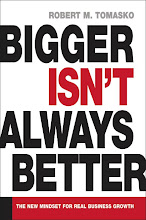November 26, 2009
Toyota: bigness self-corrects
Martin Zimmerman, in today’s LA Times, lays out the case:
A quest for bigness seems to have done-in both Toyota and its rival, GM. And created an opening for more nimble competitors:
Link
Some say the Japanese company has sacrificed its legendary quality in recent years to reach the goal of becoming the world's No. 1 automaker.
The litany of quality and safety issues has led some industry experts to wonder if Toyota's rapid expansion in the 2000s, which enabled it to pass General Motors as the world's biggest automaker, came at the expense of the company's legendary engineering and quality control prowess.
Toyota executives have conceded as much, acknowledging as far back as 2005 that the company needed to get "back to basics."
And after a fatal August crash of a Lexus ES 350 in San Diego was blamed on runaway acceleration, Toyota President Akio Toyoda issued a public apology.
"Customers bought our cars because they thought they were the safest but now we have given them cause for grave concern. I can't begin to express my remorse," Toyoda said in a statement.
At risk, some say, is the very trait that made the automaker No. 1.
"There's nothing else to the brand," said John Wolkonowicz, an analyst with consultant IHS Global Insight. "It's not built on eye-catching design. It's not built on a cutting-edge driving experience. It's not built on performance. It's built on quality and low cost of ownership."
"Toyota has spent the last five or 10 years concentrating on being the biggest instead of the best, and that's a shame," said Jake Fisher, senior engineer at the nonprofit Consumer Union, which publishes Consumer Reports.
That kind of negative perception could ultimately erode the price premium that Toyota has long enjoyed in the U.S. because of its reliability, said Mark Oline, an auto industry analyst for Fitch Ratings.
A quest for bigness seems to have done-in both Toyota and its rival, GM. And created an opening for more nimble competitors:
Toyota's quality stumbles have helped open the door to competitors, particularly Korean automaker Hyundai. And domestic automakers such as Ford may also be able to attract former Toyota loyalists whose trust in the Japanese brand has been eroded.
Link
